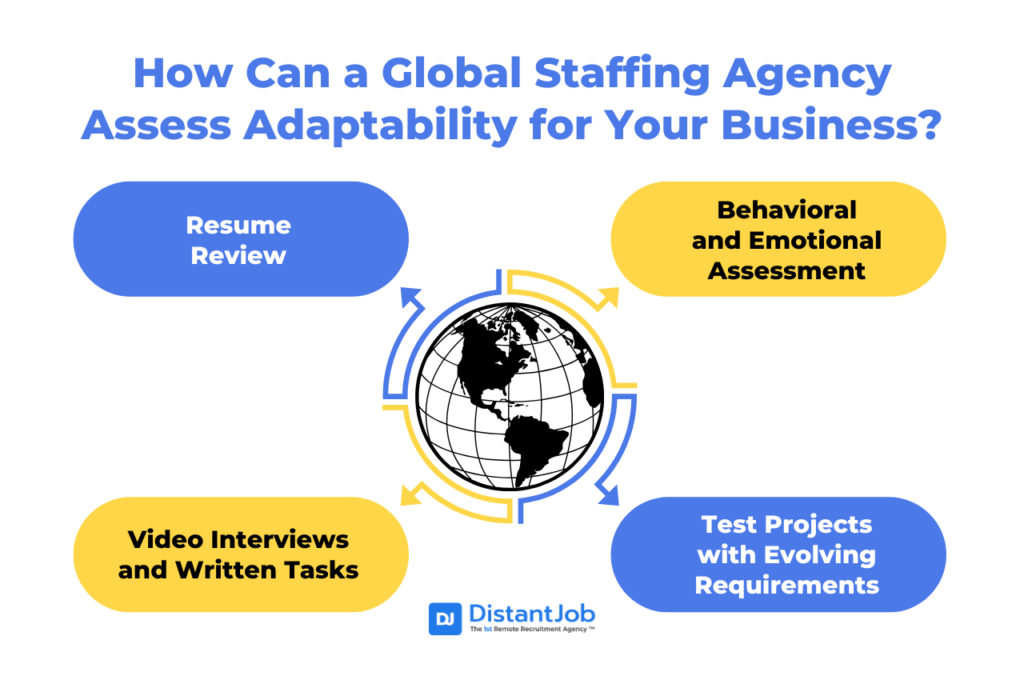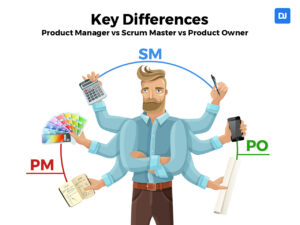Adaptability in the workplace is a skill that allows a person to be flexible and adjust to sudden, unexpected changes and conditions that are beyond their control. An adaptable professional knows how to handle these challenges without being thrown off course, negatively affecting a project and a team.
In fact, it’s such an important skill to acquire that 71 percent of executives in a survey of 90 countries identified it as the most important trait to have.
If that is still not a good enough argument, let’s consider this. Your team will have to deal with changes in software and hardware, changes in structure, changes in leaders, and even changes in direction. Only the more adaptable professionals will survive these changes, improving the team’s performance and the performance of your company as a whole.
That is why global staffing agencies like us use different methods and techniques like the ones we will be discussing in this article, to not only check how adaptable an employee is but also how adaptable they’ve been in the past.
Let’s get started.
Why is Adaptability Important in the Workplace?
Any employer or team leader will tell you that counting on stability within the company and the market is more of a dream than a reality. So you don’t want to hire people who can’t handle these natural fluctuations. Unadaptable employees are likely to panic during unstable situations, which can interfere with their ability to think critically and make the best decisions to help their project, their colleagues, and themselves.
On the other hand, when you hire for flexibility, resilience, and emotional intelligence (the main components of adaptability), along with your technical requirements and productivity expectations, you have an employee who can make these uncomfortable, inevitable choices without a second thought. An adaptable individual will address changes and challenges with a sense of calm and curiosity, rather than with fear.
So what is adaptability in the workplace? It’s a survival skill that ensures an employee’s footing stays firm, even when everything is changing. Adaptability gives employees the ability to quickly change direction and continue working productively when needed, keeping your company relevant in a constantly changing business environment.
How Can a Global Staffing Agency Assess Adaptability for Your Business?

To do this properly and make the right strategic decision for your company, global staffing agencies have invested in different techniques and methods to assess how adaptable a candidate can be.
Here’s how:
1. Resume Review
The first thing anyone ever checks about a candidate is their resume, and we do too. But, when it comes to making sure a candidate is adaptable, we read their info from a different perspective. And what we look for are tell-tale signs of their flexibility and ability to adjust, and these normally show up in their resume as:
- Remote work experience, particularly in global teams;
- Roles where they were either leading or involved in different departments;
- Positions where they had multiple responsibilities and had to wear different or multiple hats;
- Moves or promotions, either vertically or horizontally;
- Relocations, nationally or internationally.
Remote and international experience show us a candidate’s ability to deal with multiple cultures, language differences, asynchronous work, and major time differences, among other things. Experience working in different positions gives us an idea of how well they fit into different roles and teams, and it tells us how adaptable they are to different types of tasks, even if it’s with the same company.
We look at how long they stayed in those positions and at the company. This also gives us an indication of how well they adapted to the different challenges they faced.
2. Video Interviews and Written Tasks
Besides looking at the experience they share with us on their resumes, and also to take it one step further, we use video interviews and written tasks to evaluate some key skills that show us how adaptable a candidate is and can be, such as:
Communication skills
Communication skills is a big one, as it’s one of the foundations of any type of work, and even more so remote global work. When you can’t see your coworkers face to face and a lot happens through written communication, a candidate’s ability to communicate well and openly directly impacts how they adapt to new positions and new jobs.
To assess this skill, we look at:
- First, their English verbal and written skills. (This is non-negotiable.) Since most of our employees are not from the US, we check to see how well they can communicate in English.
- Second, how open and clear they have communicated and are willing to communicate in the future about their work, such as sharing progress, providing feedback, and sharing the rationale behind their decisions.
- Third, monitoring their ability to document.
- Fourth, their comfort level working in an asynchronous environment. Delays in communications are unavoidable.
We put them through real-life communication simulations. This sounds more complex than it is. It can be as simple as having a short email or Slack conversation (yes, you can immediately tell their English level from the first batch of exchange emails) and asking about the documentation of a pretend project or for past documentation that they did, if it’s not confidential information. This can also be accomplished with a video interview, which is also a must in assessing it.
Cultural Intelligence and Fit
Assessing a candidate’s cultural intelligence and getting a positive result is an excellent sign that their adaptability is on point. It means they can not only be open, flexible, and adapt to their different cultures within a team, but also to the company culture, meaning they can be a cultural fit to the organization that’s hiring them.
My tip is to have the candidate participate in more than one video interview with different people from different levels of the organization and different countries. This way you can evaluate the candidate’s ability to handle different types of communications such as direct and diplomatic communications, and perhaps not-so-diplomatic communications.
By evaluating their cultural intelligence and cultural fit, global staffing agencies can get a much better understanding of a candidate and their skill to be adaptable and flexible in the work, and actually match your company’s style and culture.
3. Behavioral and Emotional Assessment
Although behavioral and emotional assessment is ongoing and mostly present at all steps involved in assessing a candidate’s adaptability skills, there are some specific tests global staffing agencies use to evaluate this skill and other accompanying ones.
By accompanying skills, in this case, we mean, for example: resilience, patience, problem-solving, conflict resolution, active listening, emotional stability and intelligence, and stress management.
We do that by:
- Running behavior tests;
- Using pre-screening questionnaires;
- Scenario-based interviews;
- Creating scenarios where these specific skills are tested.
All of these techniques allow us to test how an employee will handle everyday pressure and unpredictable situations. These include unforeseen structural or project changes and different types of conflicts among employees.
We learn if the employee is an active listener (people often listen to respond instead of understand) and how the employee handles feedback (whether they take it personally or constructively).
We also find out how well they handle conflicts, understand how well they can solve problems, and see how they function when under stress.
In conclusion, we evaluate how the candidate will affect the team beyond their task requirements. Will the employee be a positive or negative influence on the team? How an employee handles communications and how emotionally intelligent they are can affect the success of a team, which is why all these evaluations are essential in evaluating a candidate’s adaptability.
4. Test Projects with Evolving Requirements
Finally, we get to the part where we measure how adaptable someone is in terms of adaptability itself, but also their technical match to your company.
And although this is showing up here at #4, it doesn’t mean it’s less important than the others, because it isn’t. Take it as the final step, the big boss. Think about it, the candidate has gone through the prior steps and continues to move on in the hiring process. We all know by now they have the experience, qualifications, and technical know-how to succeed in your company, and we also know that they’re a match in other important factors that make them adaptable and a match to your business.
But are they a perfect match? To make sure they are, now is the time when we can put that all into action to see how they’d actually do, were they already working for you. And that’s where test projects with evolving requirements come into play.
Global staffing agencies like DistantJob give employees what is called a tech challenge. This means we give candidates a paid test and observe how they perform when they are being evaluated based on their adaptability, along with the other traits we previously discussed. The tech challenge is a minefield that gives the candidate many curveballs, including delays because of the asynchronous timing or holidays in other employees’ countries, technical debt and changing requirements, poor documentation from a previous developer, and much more.
What we’re saying is, let’s see how well they do the job when nothing is going their way. Can they adapt to the changing requirements and challenges they face, while performing well?
If they’re able to go through the big boss and come out the other side victorious, we know, then, they’re truly adaptable and the perfect match for someone’s business
Wrapping up on workplace adaptability
Now you know how valuable adaptability really is, and how equally so it is to assess it, so you can make the best hires. By focusing on evaluating employees based on their experience dealing with other cultures, other times zones changing demands, and other unknown situations, global agencies make sure that remote employees can be productive even when things change.
So, if you find it difficult to do, consider pros like us, who can do it well and in no time. With our expertise, we can find you not only the best remote developers for your team, but also the ones that would surely integrate well into your business, and adapt to your needs, goals, and short and long-term plans. As a result, you will get a team that aligns with your company culture, speaks your language (literally), and is ready not only to hit the ground running but change directions when necessary.
Don’t waste any more of your precious time. Connect now with a senior recruiter who’ll take care of it all for you.





